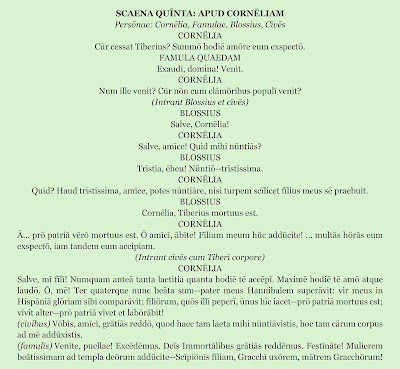Here again is the
answer to the last question in the previous post:
https://adckl2.blogspot.com/2025/06/level-3-review-irregular-verbs-7-possum.html
https://adckl.blogspot.com/2025/06/011025-level-3-review-irregular-verbs-7.html
[i] Yesterday, [ii] to the best of my ability [= in
whatever way I could] [iii] I myself wrote a letter containing
predictions, which I hope may prove false.
Nam [i] prīdiē quidem, quōquō modō [ii] potueram,
[iii] scrīpseram ipse eās litterās, quārum vāticinātiōnem falsam esse
cupiō. (Cicero)
[Literally: [i] The day before [ii] in whatever way I
had been able [iii] I myself had written … ]
Take a close look
at both the Latin original and the translation
[i] Yesterday
[ii] I myself wrote a letter │ [i] prīdiē quidem … [ii] scrīpseram
ipse eās litterās
- The translation is ‘yesterday’; the original is prīdiē (the day before)
- The translation is ‘I wrote’; the original is scrīpseram (I had written)
in whatever way I
could │ quōquō modō potueram
- The translation is ‘I could / was able to’; the original is potueram (I had been able)
These are examples
of epistolary tenses i.e. used in letter writing. It is a feature to be
aware of when, for example, reading Cicero’s letters.
Very few people
nowadays write postcards, but here’s an example: “We’re in Majorca and the kids
are having a lovely time. I’m sitting by
the pool as I write this, and yesterday we all went to the beach.”
The content is
from the time perspective of the writer. On the basis that a reliable postal
service will get the postcard to its recipient within a few days, the sequence
of tenses presents an ‘ongoing’ situation where events are happening or have
recently happened: We’re in Majorca; the kids are having a
lovely time; I’m sitting by the pool as I write this;
yesterday we all went to the beach.
One theory – which
is reasonable enough – is that, given the length of time it would take in
Ancient Rome for any correspondence to reach its recipient, a considerable time
lapse would ensure that events described in a letter would be well and truly
over by the time the recipient reads about them. Therefore, you will come
across a shift in tenses where the writer describes the events from the time
perspective of the recipient i.e. the content ‘moves back’ in time like
a past tense narrative with no sense of ‘now’. In other words, imagine that the postcard took
several weeks to arrive: “We were in Majorca and the kids had a
lovely time. I was sitting by the pool as I wrote this,
and the day before we had all gone to the beach.”
Neque tamen, haec
cum scrībēbam, eram nescius quantīs oneribus premerēre (Cicero) │
Nor while I write this am I ignorant under what burdens you are
weighed down.
Cicero is
writing the letter in his present time, but he shifts it to past tenses
because, by the time the recipient reads it, the events have already
happened. Therefore, what he literally writes is: “Nor while I
was writing this was I ignorant …”
Similarly:
Nunc eram
plānē in mediō marī. │ At present I am far out at sea. [i.e. by the time
the recipient reads the letter, Cicero is no longer far out at sea, but that’s
where he was at the time the letter was written]
Ā Brundisiō nūlla
adhūc fāma vēnerat, et erat hic diēs VII Īdūs │
From Brundisium no news has come yet, and to-day is the 9th
of March. [i.e. he is writing the letter on March 9th and, at
the time of writing, no news has come, but, again, by the time the recipient
read it, the day was March 9th and no news had come]
Hīc nōs C.
Mārcellum habēmus, eadem vērē cōgitantem aut bene simulantem; quamquam ipsum nōn
vīderam, sed ex familiārissimō eius audiēbam. │ Here I have C. Marcellus, who holds the
same views as myself or makes a good pretence of doing so. Although I have
not met him I hear it from one of his most intimate friends.
Capuae Nōnīs Febr.
esse volēbam, quia cōnsulēs iusserant. │
I want [literally: I was wanting] to be at Capua on the 5th of
February, as the consuls have ordered [literally: had ordered].
Therefore:
[i] Yesterday
[ii] I myself wrote a letter …│ [i] prīdiē quidem … [ii] scrīpseram
[pluperfect] ipse eās litterās Literally: [i] the day before
(I was writing this) [ii] I myself had written a letter …
in whatever way I
could │ quōquō modō potueram [literally: in whatever way I had
been able]
Further examples
from Cicero, all of which use a pluperfect tense whereas English translates
them as perfect or simple past tenses:
Dē Caesare vīcīnō scrīpseram
ad tē │ I wrote to you about your neighbour Caesar
Ad Hirtium dederam
epistulam ..., quam scrīpseram proximē in Tusculānō. │ I have given
/ sent a letter to Hirtius ... which I wrote lately at Tusculum.
Philotimō dederam
ad tē litterās │ I gave Philotimus a letter to you.
Nūllās enim adhūc accēperam
│ I’ve received no <letter> so far.
Ad tuās omnīs
[epistulās] rescrīpseram ¦ prīdiē. │ I answered all your letters ¦
yesterday [literally: the day before].
This use of epistolary tense, however, is not consistent and tends to be used when referring to temporary situations i.e. events happening at the time the letter was written. It is not an aspect of the language that needs much focus, but simply awareness that it exists.














